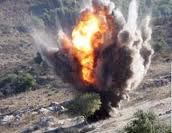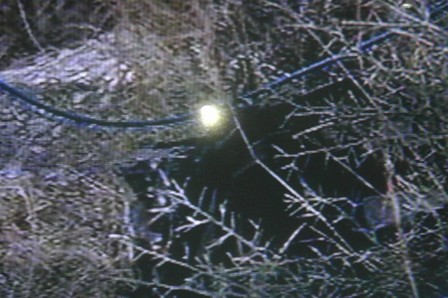"Israel" "warns" not finished with Lebanon, Plans "Disproportionate Force"

Source: axisoflogic.com, 04-12-2008
Editor's Note: This newsletter discusses the Summer, 2006 "Israeli" attack on Lebanon, "Israel's" continuing warplane flights over Lebanon and new threats of using "disproportionate force" against Lebanon - a term often used by humanitarian agencies critical of "Israel" in 2006. The Reuters/YNet article addressed by this News Letter can be read on Axis of Logic. - LMB
October 2008 Newsletter from Friends of Lebanon (friendsoflebanon.org)
"But wasn't that war over ages ago?" someone asked me the other day when the topic of "Friends of Lebanon" came up. Of course the conversation turned to the question of which war. When looking at the history of Lebanon, it is a challenge indeed to chop up the element of war into neat little packages, label them, and consign them to days-gone-by. Conflicts have overlapped; conflicts have intensified and abated. But the sheer impact of these conflicts-invasions, occupations, atrocities, massacres, war-have remained a constant figure in Lebanon and how Lebanon is perceived by itself and by others.
"Israel's" Attack, Summer 2006
The war to which he referred was that of the Summer 2006, a war which had been planned years prior to its explosion, and a war which has lingered on ever since. Although the overt hostilities were restrained in August/September 2006, their impact has continued to drive both the Lebanese and those who watch the Lebanese.
The Lebanese, for the most part, were driven to self-analysis. There was a steady flow of NGOs and campaigns within Lebanon with one focus: to defend the integrity of Lebanon. There was also, although rocky at times, a distinct movement amongst political entities in Lebanon: to conceptualize an enduring Lebanon. The consensus? The essence of Lebanon is its pride in diversity. And so the spirit of cooperative defense of Lebanon was borne out of the agony of watching its children die.
Lebanon Rebuilds
Sympathy was voiced by many around the world, who offered assistance to rebuild. Within two years of the war, the Lebanese had kindled a prosperous economy, had formed a national unity government, and had made definitive plans to maintain ongoing internal peace and stability.
To enhance its own identity, on 15 October Lebanon officially established diplomatic relations with Syria. Ending over sixty years of a convoluted, conflict-ridden relationship with its neighbour, Lebanon now benefits from a clearly defined and equitable national status.
"Israeli" Warplanes Bully while "Israel" Plans "Disproportionate Force"
But then the essence of the impact of the Summer 2006 War has, this past month, reared its ugly head once again. Amidst continued overflights of "Israeli" warplanes over Lebanon, on 3 October, "Israeli" Northern Command chief Maj.-Gen. Gadi Eisenkot boasted, "We will apply disproportionate force on it [every village from which 'Israel' is fired on] and cause great damage and destruction there. From our standpoint, these are not civilian villages, they are military bases. This is not a recommendation. This is a plan. And it has been approved."
The Major-General likened the proposed destruction to that which, in 2006, the "Israelis" had inflicted on Dahiya, a suburb of Beirut. To be fair, he did specify the intended target to be Lebanese villages "from which 'Israel' is fired on," so, ostensibly, if "Israel" were not targeted, neither would be the Lebanese village. On the other hand, with the memory of such ludicrous excuses as Qana having been one of those villages from which "Israel" was fired upon, this defense stipulation is hardly reassuring. And he himself smirked "disproportionate," in an apparent jibe at the criticism of "Israel" most commonly cited by humanitarian agencies in 2006.
The Media in Complicity
There was, of course, a quiet gasp amongst journalists, activists, and so on. It might have settled into the pile of similar threats, but a few days later Yaron London, an "Israeli" media personality, upped the ante. A liberal journalist who last year received the Sokolow Prize for lifetime achievement, London paraphrased Eisenkot and cheered him on "we shall destroy Lebanon and won't be deterred by the protests of the ‘world'." I shudder to think what his implication is in signifying "world" as such.
London brazenly declares that "Israel" "shall not show mercy when it comes to hitting the national infrastructure" of Lebanon. Why? Because, says London, all of Lebanon is now Hizbullah; all of Lebanon is therefore the "bad guys," (an assertion so ridiculous it barely merits repeating; the reason for doing so follows). He states:
"This [the whole of Lebanon being Hizbullah/Nasrallah/Iranian outpost] is both bad and good. It's bad, because north of us there is a state that is entirely 'malicious'. It's good, because there is no longer any need for complicated distinctions. 'Israeli' strategists' new point of view is that Lebanon is an enemy, rather than a complex puzzle of factions, some of which are enemies while the others are victims of a situation not under their control."
London thus concludes that the "Dahiya strategy" of obliteration is a just and welcome approach.
How is this? A liberal journalist seething with, as he says, the need to sow fear? Over the next two days, 28 comments were posted on the Ynet news service.
(Obviously Ynet selected what it published, but it should be remembered this is a mainstream news service, "'Israel's' number one source for online news." Its tag line being "The real 'Israel' in real time," Ynet is "part of Yedioth Group, 'Israel's' largest media company.")
Though a few comments questioned "Israel's" ability/strength to follow through, nearly all praised London's strategy of annihilation. One comment meekly suggested avoiding war crimes. Only one of the 28 comments challenges the Dahiya strategy as causing in the long term "more and more Arab and Jewish kids dead." But even that one comment merely suggests that such a strategy is inefficient, not that it is wrong.
[Axis of Logic Editor's Note: Scroll down to see the titles of these readers' responses to "Israeli" Maj.-Gen. Gadi Eisenkot's statement. - LMB]
Sadly, there was but an even quieter gasp amongst journalists, activists, and so on. And then all heads turned to Syria as the US choppered in its commandos to shoot down eight civilians in its never-ending quest to hunt down those it considers "bad guys."
The war over ages ago? No, unfortunately not. Threats are cheered by belligerent neighbours and shrugged off by a war-weary world. Overflights of "Israeli" warplanes continue to shriek through the skies of Lebanon. They do not, however, sow the fear so needed by Eisenkot, London and their supporters. Instead, such taunts instill in the Lebanese a firm defiance. It seems Lebanon is determined to bridge East and West by nurturing the best of both.



